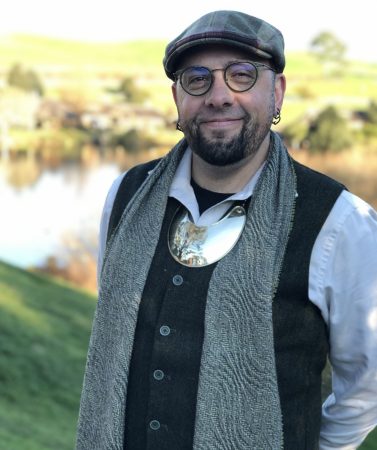
Professor, Critical Indigenous Studies and English
Canada Research Chair in Indigenous Literature and Expressive Culture
Office: Buchanan E258
Phone: 604-827-5176
Email: daniel.justice@ubc.ca
Quick Links
Daniel Heath Justice is a Colorado-born citizen of the Cherokee Nation and Professor of Critical Indigenous Studies and English Language and Literatures. He received his B.A. from the University of Northern Colorado and his M.A. and Ph.D. from the University of Nebraska-Lincoln. Before coming to UBC in 2012, he spent ten years as a faculty member in the Department of English at the University of Toronto in Haudenosaunee and Anishinaabe territory, where he was also an affiliate of the Aboriginal Studies Program.
Daniel’s work in Indigenous literary studies takes up questions and issues of kinship, belonging, sexuality, personhood, and nationhood, with increasing attention to the intersections between Indigenous literatures, speculative fiction, and other-than-human peoples. His published work includes the literary studies Why Indigenous Literatures Matter and Our Fire Survives the Storm: A Cherokee Literary History, the animal cultural histories Raccoon and Badger, the Indigenous epic fantasy The Way of Thorn and Thunder, and various edited and co-edited works, including The Oxford Handbook of Indigenous American Literature (with James H. Cox), and Allotment Stories: Indigenous Land Relations Under Settler Siege (with Jean M. O’Brien).
Visit Daniel’s website.
Current Research
Our Creaturely Kin: A Podcast on Other-than-Human Histories, Lives, and Relations, part of the SSHRC-funded Amplify Podcast Network, is a podcast series in development dedicated to understanding the powerful, peculiar, sometimes painful, always complex relationships between humans and the other-than-human beings with whom we share our lives in North America/Turtle Island. Each episode considers not just biology and natural history but the role of the animal or plant in human cultures, economies, and imaginations, and draws on a diverse and eclectic range of knowledge holders for in-depth interviews, including scientists, historians, artists, wildlife activists, hunters and trappers, food sovereignty advocates, and others from within and beyond the academy. Approachable and engaging, it appeals to both interested laypeople and specialists. The purpose of the podcast and each individual episode is twofold: to illuminate the complex realities of iconic as well as unexpected individual plant and animal species, and to help audiences gain a greater appreciation for our relationships with them in all their diversity and contradictions. Each season ends with a half-length reflective citational episode that addresses the season’s critical, theoretical, and methodological concerns, along with the research process, scholarly questions that emerged, generative audience feedback, and emerging implications.
Areas of specialization:
- Indigenous literary studies
- Indigenous Studies
- Animal studies
- Speculative fiction
- Gender and sexuality
Winter Term 1
FNIS 100 (3) Indigenous Foundations
The historical, cultural, political, economic and legal issues that inform the experiences of Indigenous peoples in Canada, examined from both Indigenous and non-Indigenous perspectives. Credit will be granted for only one of FNIS 100, FNSP 100, or FNSP 200.:
Pre-req/co-req: none
Term: 1
Winter Term 2
FNIS 320 (3) Critical Indigenous Methodologies and Ethics
Responsible and community-based research from a critical Indigenous perspective; methods for identifying and assessing research materials, critical analysis, oral history/qualitative research interviewing and analysis, and research ethics in the design and implementation of community-based student research projects. Credit will be granted for only one of FNIS 320 or FNSP 320.
Pre-requisite: Either FNIS 310 or FNSP 310
Term: 2
For a full list of our course offerings and their instructors, please visit this page.
Featured Publications
Raccoon. Animal Series, ed. Jonathan Burt. London: Reaktion, 2021. 224 pp. (Book)
Allotment Stories: Indigenous Land Relations Under Settler Siege. Co-edited with Jean M. O’Brien. Minneapolis: U of Minnesota P, 2022. 376 pp. (Book)
Authored Books
- Why Indigenous Literatures Matter. Waterloo, ON: Wilfrid Laurier UP, 2018. 284 pp.
- Badger. Animal Series, ed. Jonathan Burt. London: Reaktion, 2015. 224 pp.
- Our Fire Survives the Storm: A Cherokee Literary History. Minneapolis: U of Minnesota P, 2006. 277 pp.
- The Way of Thorn and Thunder: The Kynship Chronicles. Fully revised, one-volume omnibus edition of The Way of Thorn and Thunder trilogy. Albuquerque: U of New Mexico P, 2011. 616 pp.
Co-Edited Books
- The Oxford Handbook of Indigenous American Literature. Co-edited with James H. Cox. New York: Oxford UP, 2014. 741 pp.
Selected Journal Articles, Book Chapters, and Short Stories
- “R is for Raccoon.” Animalia: An Anti-Imperial Bestiary for Our Times. Eds. Antoinette Burton and Renisa Mawani. Duke UP, 2020. 153-161.
- “Tatterborn.” Read, Listen, Tell: Indigenous Stories from Turtle Island. Eds. Sophie McCall, Deanna Reder, and David Gaertner, Wildrid Laurier UP, 2017. 327-336.
- “The Boys Who Became the Hummingbirds.” Love Beyond Body, Space, and Time: An Indigenous LGBT Sci-Fi Anthology. Ed. Hope Nicholson. Toronto: Bedside Press, 2016. 54-59.
- “Reflections on Indigenous Literary Nationalism: On Home Grounds, Singing Hogs, and Cranky Critics.” Sources and Methods in Indigenous Studies. Eds. Jean O’Brien and Chris Andersen. Routledge, 2016. 23-30.
- “A Better World Becoming: Placing Critical Indigenous Studies.” Critical Indigenous Studies: Engagements in First World Locations. Ed. Aileen Moreton-Robinson. Tucson: University of Arizona Press, 2016. 19-32.
- “Indigenous Writing.” The World of Indigenous North America. Ed. Robert Warrior. New York: Routledge, 2014: 291-307.
- “Notes Toward a Theory of Anomaly.” Special issue of GLQ: A Journal of Lesbian and Gay Studies, ed. Mark Rifkin, Bethany Schneider, and Daniel Heath Justice, 16.1-2 (2010): 207-42.
 Faculty of Art
Faculty of Art